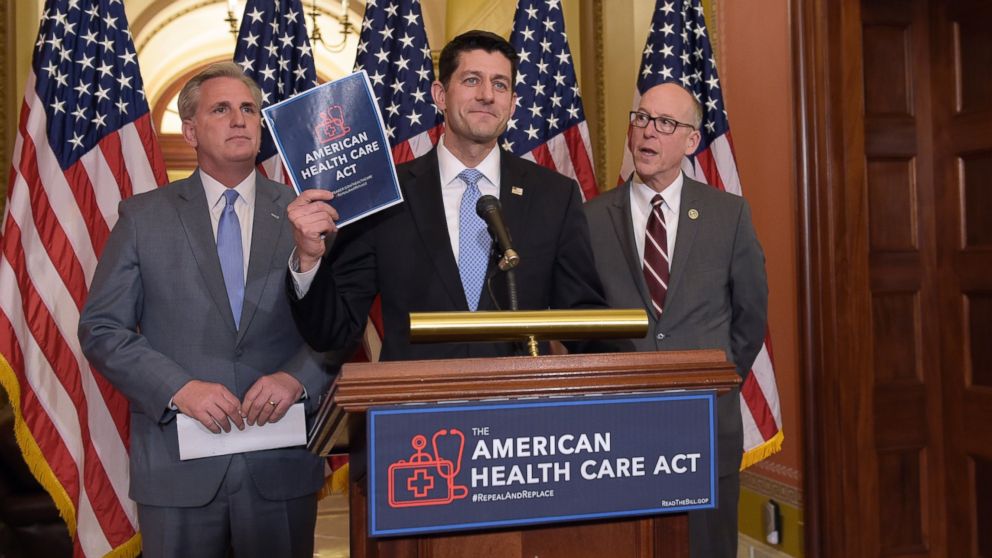Vice President Mike Pence has been making the rounds at the Capitol, meeting with key conservative Republicans like Reps. Jim Jordan of Ohio, Mark Meadows of North Carolina, Dave Brat of Virginia and Mark Walker of North Carolina on Wednesday and Sens. Pat Roberts of Kansas, Rob Portman of Ohio and John Thune of South Dakota on Thursday.
What is reconciliation?
Reconciliation is a powerful tool that enables the Senate to dodge a filibuster, requiring just a simple majority to pass a bill.
But the so-called Byrd rule mandates that every provision in a reconciliation bill must have a direct impact on mandatory spending or revenue. In other words, everything must pertain to spending money, like issuing tax credits or changing health savings accounts, or to revising revenue streams, like cutting taxes.
While Trump and many Republicans want to remove regulatory barriers, such as to selling health insurance across state lines, that would not have a direct budgetary impact, so that may not be part of reconciliation.
“What people are sort of learning is this reconciliation tool is pretty tight,” House Speaker Paul Ryan, R-Wis., explained. “There’s a lot of stuff we would love to put in the bill but, unfortunately, the Senate rules don’t allow us to do that.”
What happens next in the House?
Now that the two committees have completed their work, they will report their bills to the House Budget Committee, according to House Majority Leader Kevin McCarthy, R-Calif., where the two measures will face another markup to bind the bills into a single document.
Reconciliation rules prevent Budget Committee members from offering amendments to change policy in the bill. They may make only technical changes, like inserting commas and fixing typos.
Soon after that, McCarthy anticipates the full House will consider the legislation, but he won’t proceed without a confident count of the votes necessary to pass the bill: at least 216 (down from the usual 218 because five seats are vacant).
The Budget Committee will then send its product to the House Rules Committee, where Republican leaders are likely to block further amendments if they have the votes to pass the reconciled legislation. It’s possible the legislation could come to the floor under a modified rule to accept a limited amount of amendments, intended to help it cross the finish line.
When will the Senate act?
Assuming no hiccups, Senate Majority Leader Mitch McConnell, R-Ky., said he hopes to consider the House’s bill before the Easter-Passover recess, which begins April 10.
If the Senate makes any changes to the House bill, that would punt the bill back to the lower chamber for another vote.
But without any changes, Trump could sign the legislation into law before the White House Easter Egg Roll on April 17.
","url":"https://www.goodmorningamerica.com/news/story/road-repealing-replacing-obamacare-46021299","contentType":"story","section":"news","wordCount":769,"columns":2,"inlinesTypes":["contentPromo","contentPromo","contentPromo"],"provider":"ABC News","publisher":{"name":"ABC News","logo":{"name":"ABC News","url":"https://s.abcnews.com/images/Site/abc_logo_aluminum_60px.png","height":60,"width":150,"@type":"ImageObject"}},"contributors":[{"name":"Good Morning America","url":"","role":"","logo":"","logoAlt":"","type":""}],"publishedDate":"2017-03-09T19:29:00Z","firstPublishedDate":"2017-03-09T19:29:00Z","modifiedDate":"2017-03-09T22:13:04Z","editorialDate":"2017-03-09T19:29:00Z","alternativeHeadline":"In the House alone, the process is expected to take at least three weeks.","articleSection":"Politics","metadata":{"timestamp":"2017-03-09T19:29:00Z","dateModified":"2017-03-09T22:13:04Z","sourceLine":"GMA","keywords":"Obamacare, health care, Trump, Ways and Means Committee, House, Senate, GOP, Congress, Paul Ryan, Kevin McCarthy, Mitch McConnell","title":"The road to repealing and replacing Obamacare","description":"In the House alone, the process is expected to take at least three weeks.","canonicalUrl":"https://abcnews.go.com/Politics/road-repealing-replacing-obamacare/story?id=46021299","noIndexNoFollow":false},"dateline":"—","isShared":false,"shareData":{"description":"In the House alone, the process is expected to take at least three weeks.","title":"The road to repealing and replacing Obamacare","url":"https://www.goodmorningamerica.com/news/story/road-repealing-replacing-obamacare-46021299","shareButton":"inline","networks":["facebook","twitter","pinterest","email","link"],"source":"GMA","img":"https://s.abcnews.com/images/GMA/default-img-16x9.png","size":"m","popoverPlacement":"bottom"},"socialImage":{"caption":{"text":"House Speaker Paul Ryan speaks during a news conference on the American Health Care Act on Capitol Hill in Washington, March 7, 2017.","source":"Susan Walsh/AP Photo","fauxSpacing":"--","lines":3},"image":{"src":"https://s.abcnews.com/images/Politics/AP-paul-ryan-01-as-170308_16x9_992.jpg?w=992","alt":null,"ratio":"16x9","sources":null}},"logoRadius":true,"leadMediaImage":{"caption":{"text":"House Speaker Paul Ryan speaks during a news conference on the American Health Care Act on Capitol Hill in Washington, March 7, 2017.","source":"Susan Walsh/AP Photo","fauxSpacing":"--","lines":3},"image":{"src":"https://s.abcnews.com/images/Politics/AP-paul-ryan-01-as-170308_16x9_992.jpg?w=992","alt":null,"ratio":"16x9","sources":null,"fetchPriority":"high"}},"leadMediaVideo":{"video":{"id":"46013128","autoplay":true,"ambient":false,"duration":"3:35","headline":"White House launches 'full court press' to sell health care plan","aspectRatio":"16x9","posterImg":{"url":"https://s.abcnews.com/images/Politics/AP-paul-ryan-01-as-170308_16x9_992.jpg?w=992","ratio":"16x9","caption":"White House launches 'full court press' to sell health care plan","credit":"ABCNews.com","sources":null},"live":false,"playlist":[{"id":"46013128"},{"id":"45999958"}],"ambientFullId":null,"leadVideoPreventRender":false}},"leadMediaGallery":{"disableFullscreen":false,"useDotPagination":true,"media":[]},"featuredTags":{"tags":[{"label":"Obamacare"}]},"relatedTags":{},"seo":{"JSONLD":{"videoObject":{"name":"White House launches 'full court press' to sell health care plan","description":"Trump reached out to conservative critics who have denounced the plan as \"Obamacare lite\" as House Republicans try to advance the bill amid strong Democratic opposition.","uploadDate":"2017-03-09T19:29:00Z","thumbnailUrl":[null,"https://s.abcnews.com/images/Politics/AP-paul-ryan-01-as-170308_4x3_992.jpg?w=384","https://s.abcnews.com/images/Politics/AP-paul-ryan-01-as-170308_16x9_992.jpg?w=384"],"url":"https://service-pkgabcnews.akamaized.net/opp/hls/abcnews/2017/03/170309_gma_karl_0702_,500,800,1200,1800,2500,3200,4500,.mp4.csmil/playlist.m3u8","contentUrl":"https://service-pkgabcnews.akamaized.net/opp/hls/abcnews/2017/03/170309_gma_karl_0702_,500,800,1200,1800,2500,3200,4500,.mp4.csmil/playlist.m3u8","publisher":{"name":"ABC News","logo":{"url":"https://s.abcnews.com/images/Site/abc_logo_aluminum_60px.png","@type":"ImageObject"},"@type":"Organization"},"mainEntityOfPage":{"@type":"WebPage","id":"https://abcnews.go.com/Politics/road-repealing-replacing-obamacare/story?id=46021299"},"duration":"PT3M35S"}}},"lead":{"featuredTags":{"isFeatured":true,"tags":[{"label":"News","href":"/news","ariaLabel":"News - index"}]},"ratio":"16x9","centeredLeadStacked":true,"enableBackgroundColor":true,"caption":{"text":"White House launches 'full court press' to sell health care plan","fauxSpacing":"--","lines":3,"credit":"Susan Walsh/AP Photo"},"type":"lg","mediaType":"video"},"everscrollUrl":"https://www.goodmorningamerica.com/news/story/road-repealing-replacing-obamacare-46021299","ads":{"Sticky":{"disabled":false},"RightRail":{"disabled":false},"InlineBox":{"disabled":false,"articleConfig":{"alignLg":"right"}},"InlineOutstream":{"disabled":false},"End":{"disabled":true},"Taboola":{"disabled":false,"disableAutoInsert":true,"position":"bottom","pageType":"article","headerText":"Sponsored Content by Taboola","config":{"mode":"alternating-thumbnails-a","container":"taboola-below-article-thumbnails-46021299","placement":"Below Article Thumbnails","targetType":"mix","network":"goodmorningamerica-gma","type":"article"}}},"analyticsData":null}},"analytics":{"accountID":"wdgnewwdgnewgmaweb","ns":"gma","pageName":"gma:news:story","pageType":"story","pageUrl":"https://www.goodmorningamerica.com/news/story/road-repealing-replacing-obamacare-46021299","globalSpecVersion":"v1.08","siteDifferentiator":"gma:site","tagID":"g_page01","userABCookie":"0","section":"news","title":"The road to repealing and replacing Obamacare","pubTime":"14:29","pubDate":"03-09-2017","modTime":"17:13","modDate":"03-09-2017","id":"46021299","editorialOtherSubjects":"Obamacare, health care, Trump, Ways and Means Committee, House, Senate, GOP, Congress, Paul Ryan, Kevin McCarthy, Mitch McConnell","editorialDate":"03-09-2017","wordCount":769,"columns":2,"authors":"Good Morning America","authorsUnit":"none","authorsBureau":"none","subBrand":"Good Morning America","provider":"Good Morning America","videoName":"White House launches 'full court press' to sell health care plan","videoId":"46013128","mediaOnPage":"contentPromo,video"},"taboola":{}},"request":{"headers":{},"httpVersion":"1.1","method":"GET","url":"/news/story/road-repealing-replacing-obamacare-46021299","vary":{"host":"www.goodmorningamerica.com","cached":true,"path":"/news/story/road-repealing-replacing-obamacare-46021299","forwarded-proto":"https","device":"desktop","userab":"0"}},"viewport":{"width":1260,"height":0},"user":{}};




